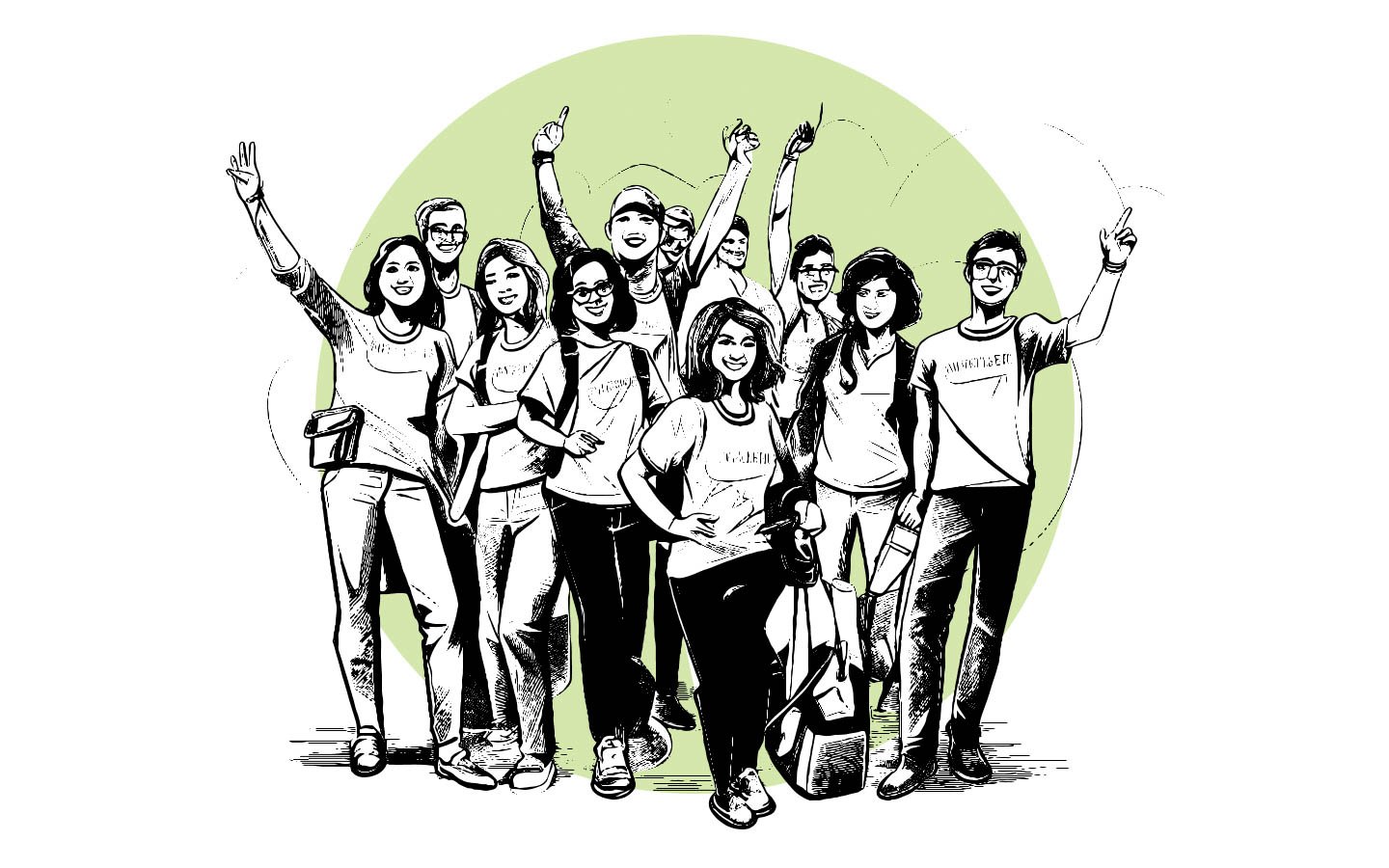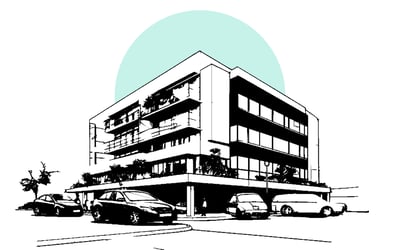We’re all striving to be happy. The ultimate goal in everything we do is to achieve a happy outcome, isn’t it? Happy relationships, happy work, happy home, happy life. We can all make the choice to be happy, right?
Happiness is the meaning and purpose of life, the whole aim and end of human existence.
So, if happiness is about personal choice and down to the individual, why is it the responsibility of an employer to make their team happy? Surely providing a job and a salary is enough?
Well, that’s not how we see things at Articulate.
Four years ago, at one of our monthly meetings, I brought up the subject of happiness. Having read about Bhutan’s Gross National Happiness Index and Google’s Jolly Good Fellow, plus having my own experience of happiness at work, I became fascinated with the power of happy, and, after four years of being a fully-fledged CHO (Chief Happiness Officer), I’m proud to say happiness is truly embedded in our company culture.

So, where did we start?
1. Strong company culture: ‘Don’t just talk happy, DO happy’
Happiness starts from within. And, in a company, that starts with its culture. If you make a decision as a company that happiness is a priority (as our CEO Matthew did when he created the CHO role), then you can start building happiness initiatives into your workplace and cultivate a happy, flourishing team.
Together, we regularly refactor our culture. Now we are a team of nearly twenty, this takes two days of brainstorming, discussion, doughnuts and lots and lots of Post-it notes, followed by beer! The result is a written blueprint of our ways of working, which is displayed in black and white on our company intranet. Everyone gets to contribute, which makes it personal, relevant and something we all care about.
'I think if you want to build a company that attracts a lot of great customers, you need to build a unique product that’s very strong. But if you want to pull in the best people and retain them, you need to have a unique, differentiated culture that’s very strong, and I think we’ve done that.' - Brian Halligan, HubSpot
We agree with Brian, and feel we have developed a unique and strong culture that is adjusting and evolving as we grow.
2. People: Lovely, lovely people
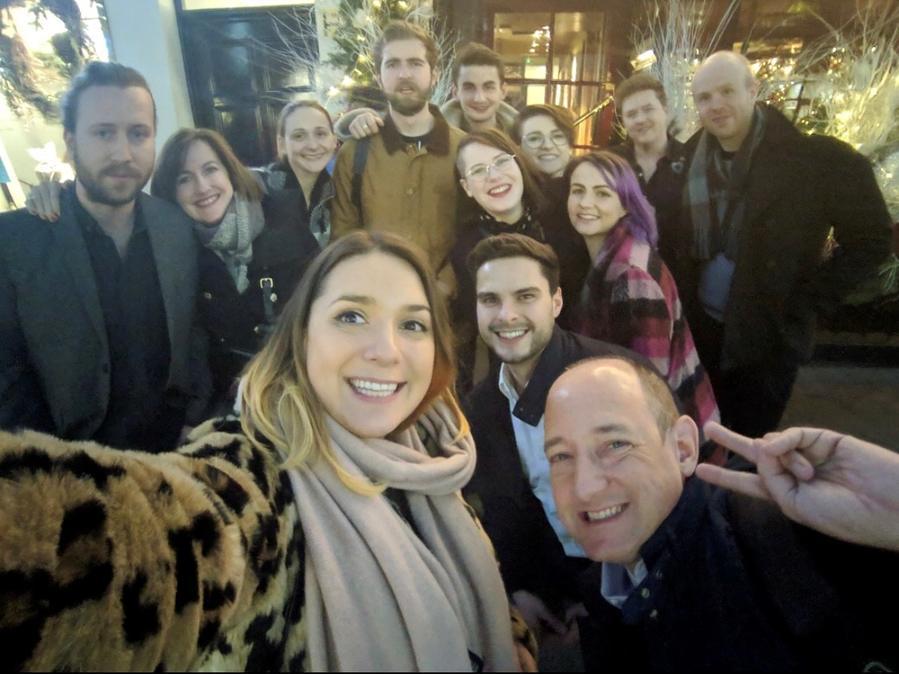
Your people are your most valuable asset. Choose them well. Make sure they are a good culture fit, and then take good care of them. If you want a happy company, don’t just talk happy, mean it and DO happy! As Matthew says,
‘We are a happy company, and it’s not by accident!'
3. Encourage friendships
Being challenged, rewarded and acknowledged for your work are all important aspects of employee happiness, but don’t underestimate the importance of relationships.
Often, it’s the daily banter that takes place between colleagues that makes the days pass in a more enjoyable way. It puts a spring in your step when you get up to face the day; it provides a space for friendships to form, and it creates a happy atmosphere, which is always a good thing. When colleagues become friends and enjoy working together, they are more likely to care about one another and provide support during difficult times, which, in turn, builds individual and team resilience.
Forming friendships was a challenge for us at Articulate. We work from home and only see each other in person once every couple of months. There’s no bumping into colleagues whilst making a cup of tea or passing in the corridor. The important relationship-forming moments that exist in an office don’t exist for us. We have to actively provide and encourage those opportunities, we just have to do it virtually with online get-togethers like our happy half hours (HHH):
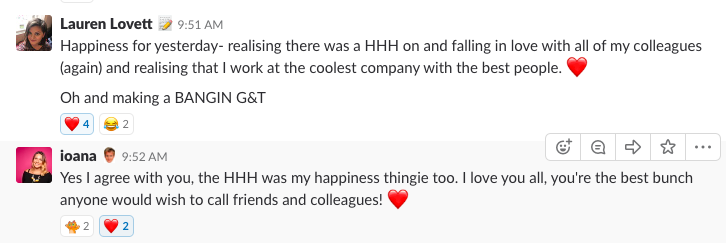
4. Allow space
Allow space to get to know one another. ‘Remote and proud’ is our motto, but remote working brings problems when it comes to building camaraderie and team.
Because we rarely see one another in person, we needed to find a way to build closeness in spite of distance. We have allowed space and time during the working week for some social interaction, and it’s working. Most weeks are sprinkled with either a 'happy breakfast' with a colleague to start the day, or a virtual coffee and a chat (a 'poddle') during the day. We also have a team 'happy half hour' (HHH) at the end of the working week.
These activities are positively encouraged because this is how we get to know one another. The added bonus is that these informal breaks from work often give rise to creative ideas that benefit the business (magic).
‘Happiness is not something you pursue; it is something you allow. Happiness is just being.’ Chade-Meng Tan
5. Happiness is the goal
We recognise that it is impossible to be happy all of the time. And we avoid forced happiness at Articulate. Sugary sweet rainbows, smiley faces and bunny rabbits are not for us.
Work and life bring stresses on a regular basis, but we try to focus on the fact that it is very often the challenges in life that help you realise your strengths and what you’re capable of. Armed with this knowledge – as well as interesting work, excellent training and supportive colleagues – we’re all striving to reach our full potential, and we are happy doing it.
6. Communication is key
As we're all working from home, we communicate regularly via Slack, and we have channels to rant, validate, express gratitude, share news, be random, offer tips, talk about food and seek advice. Oh, and there’s a plethora of dog and cat memes! There is always a bonkers conversation to be had, and for me personally, always something that makes me laugh out loud every day.
Happiness for us is a work in progress. It is part of our Articulate DNA. We take it seriously and always look for new ways to incorporate the happy into our working week. We have a team of great people who are friends that enjoy working together and genuinely care about one another. They help each other on a daily basis with work and projects, and provide support if times get a little tough. Face-to-face meetings are very much looked forward to and are always lively, creative, productive and fun.
As we continue to grow, I know we will continue to work on ways to make sure happiness is at the core of who we are as a company. This will be a challenge, but it is an exciting one, and one we are more than happy to face, together.
14 Steps to Happiness: the Articulate way
A wise Old Man told me one time
happiness is a frame of mindWhen you go to measuring a man's success
don't count money count happiness- Ken Dodd
Over the past four years, these are some of the initiatives we have tried and what has worked for us. We are a small but growing team and appreciate that some of these things might need adjusting as we get bigger. We also recognise that they may not be easily doable in larger organisations, but perhaps these ideas will spark a little inspiration for what could work in your company.
1. Happy Half Hour
It all started with a monthly happy half hour, which is our version of a drink after work on a Friday. At 4.30pm, we would choose our poison (gin, mojito, tea, beer, water, mug of port, coffee, whole bottle of wine!) and join a video conference call for a virtual gathering.
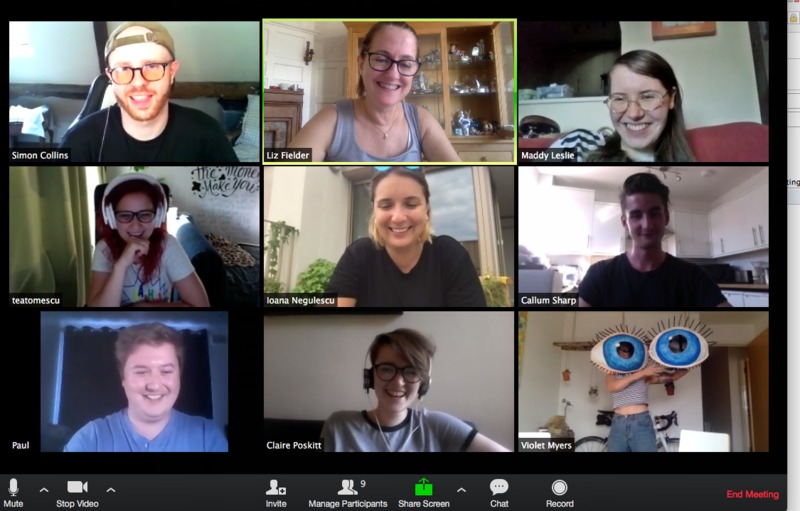
This allowed time for a chat at the end of the working week and helped us destress and get to know one another a little better. The ‘HHH’ (as it’s now known) takes place every two weeks. Sometimes, colleagues invite each other to impromptu HHH’s. When workloads are high and life’s a little stressful, it’s these moments that help us relax and laugh with the people who understand. It’s also a great way to celebrate birthdays, anniversaries and special achievements.
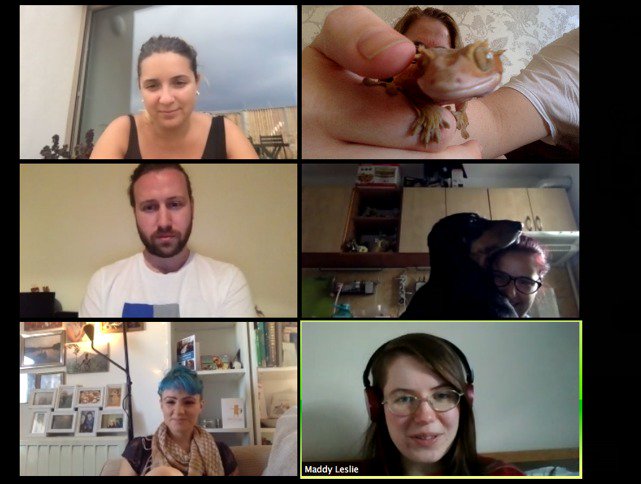
Some HHH’s have been known to last a lot longer than half an hour. Colleagues have enjoyed spending a virtual evening together. They’ve watched each other cook dinner and met each other’s partners, children and pets!

One time, Paul’s band did a virtual rehearsal of their new song for us, which was just brilliant.
Another fantastic Articulate memory made.
2. Happy Breakfasts
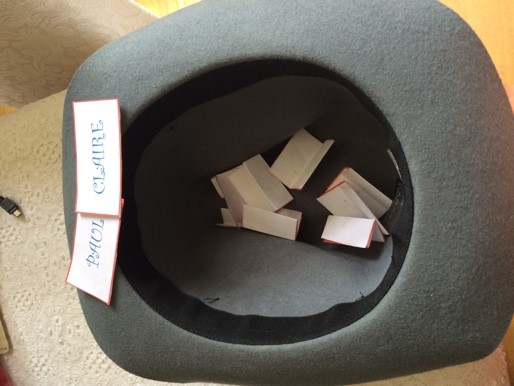
With the success of the group Happy half hours, I thought it would be nice to create an opportunity for the team to get to know one another better as individuals. Names were put in a hat (a rather fine trilby, to be precise), and members of the team would buddy up and share a virtual breakfast together.
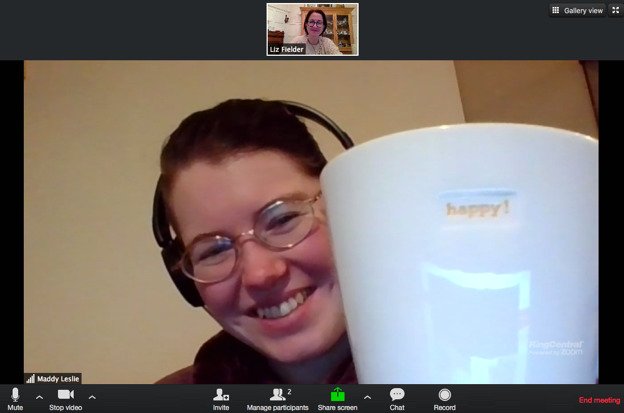
Unlike our lively happy half hours, happy breakfasts are often calmer (usually). This relaxed space is much more conducive to properly getting to know the person. It’s been particularly great for colleagues who don’t spend much time talking because they are in different teams or perform roles that don’t usually interact on a regular basis. Plus, it’s a great way to start the day.
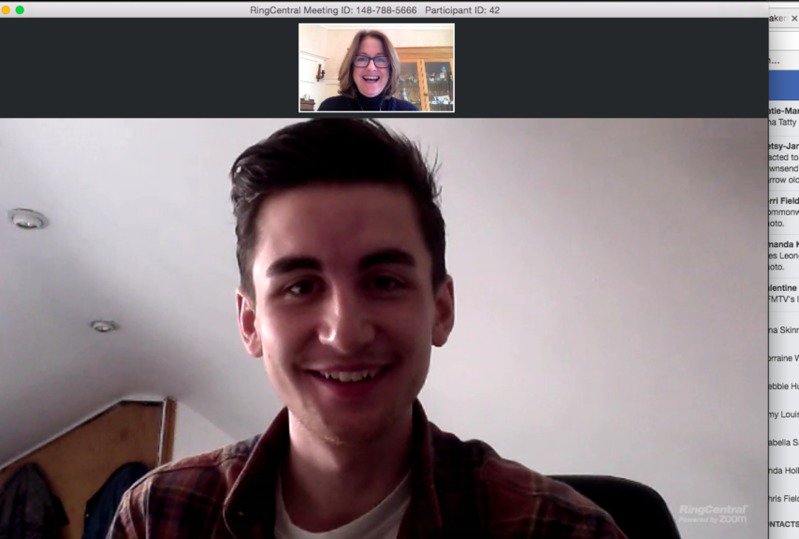
The Articulate team meets in person once every couple of months, too. I started to invite my breakfast buddy to meet me early for a face-to-face happy breakfast before the meeting. We would then extend that invitation on Slack to anyone else who wanted to join.
These meet-ups grew little-by-little, until Matthew said ‘These Happy Breakfasts are working, let’s make it official.’ It is now a ‘thing’ at Articulate, and before every company meeting, we have a team happy breakfast.
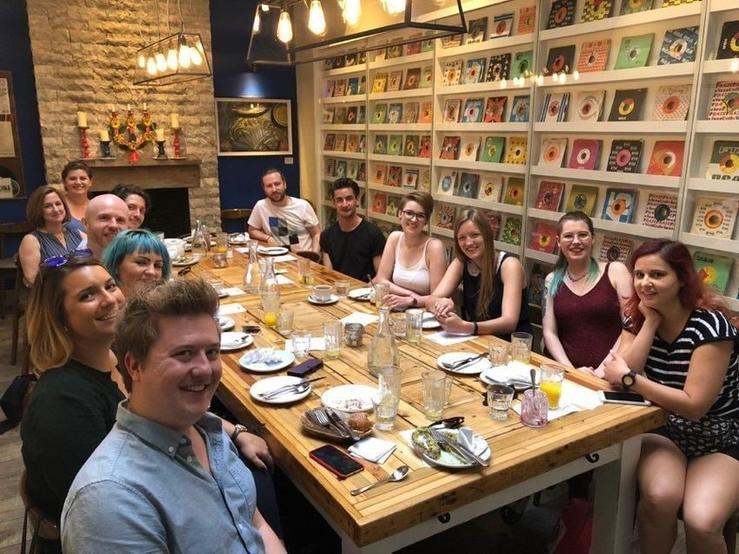
It’s amazing how many new ideas stem from a happy half hour or a happy team breakfast. Allowing space to socialise breeds creativity and sparks eureka moments. What better way to start the day than with yummy food, a nice coffee and a laugh with some lovely, lovely colleagues.
3. Poddles
Next, we wanted to create space for impromptu get-togethers during the day.
At first, we tried using a variation on the Swedish Fika and Danish Hygge models. Everyone received a box filled with goodies. They contained some Divine organic cocoa and chocolate, a Neom scent to make you happy, a miniature bottle of port or gin, biscuits, and all things needed to create your own bit of cosy at home… but it didn’t really take off.
So, we adapted. At Articulate, we work in ‘pods’ (another word for teams), and one day the word 'Poddle' came to me. Bit bonkers? Yes. But has it worked? Yes.
We now have poddle breaks prefixed with whatever you want: tea, coffee, gin (don’t worry, we do wait for the end of the day for that last one). It’s normally a 15-minute chat over a cup of something. Maybe talking about a book we’ve read, or a box set we've loved or loathed, and if it's me, a Secret Cinema experience I've attended. In short, it’s a quick reviving break from the day.
‘Liking your colleagues and building productive relationships with them is vital. Those relationships won’t always be totally work-based. Even chatting about the ending to The Bodyguard over a cup of coffee can encourage a sense of belonging to the team.’ Julia Lindsay - The iOpener Institute
4. Happy lunch
Not everyone can make the HHH’s or the happy breakfasts every time due to time zone differences or commitments with children. To make life a little easier, and ensure everyone is included in something, we have a monthly happy lunch instead. We always do our best to make sure the whole team is part of the happy stuff and will adjust to suit.
5. Happy talks
Once a month, I have a one-to-one happy talk with every member of the team, including our CEO. It’s a way to check in with everyone, see how they’re doing both at work and at home, and take the company pulse. I was a little unsure starting this whether people would welcome a monthly chat, but now I am told how much they look forward to these talks.
The conversations are confidential, but they allow me to work with the line managers and our CEO to provide support and work on career and personal development for the team. It’s also a great way to uncover potential problems and try to resolve them before they snowball into a big issue.
6. Team Leader one-to-ones
We replaced yearly appraisals with monthly one-to-ones. We find that these regular check-ins with our line managers are a much better way to makes plans and set goals and expectations. We can congratulate achievements as they happen, which is far better than waiting for a yearly assessment.
Once a year, we have a longer one-to-one split over three calls. The first call gives us time to look back over the past year. The second call lets us discuss plans for the year ahead, and the final call is to talk about salary.
7. Wellbeing
We have a wellbeing page on our intranet. It has details of the various services we can access, and there are also lots of useful wellbeing links and resources.
As a result of a suggestion on a 'happy-o-meter' (see the next point on the list), we currently have a small team looking at wellbeing and mental health. The focus is to research ways to build and improve on what we already do. We will always listen to our team and try our best to react and improve.
We took part in Time to Talk day this year in our own Articulate way by having a chat around wellbeing and mental health every day for a week.
8. Happy-o-meter
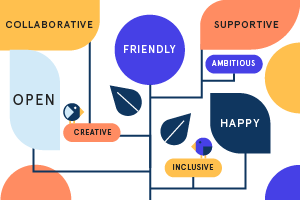
To measure staff engagement and to allow the happy talks to be a more relaxed informal chat, we created our happy-o-meter. The happy-o-meter is sent out in advance of the one-to-ones. It is a list of questions about employee happiness, job satisfaction, stress levels and culture. The illustration above shows words taken from the answer to the question, 'What one word would you use to describe our culture?’
Using Google forms, we can look back and see the company temperature, and follow whether it fluctuates. If stress levels go above a certain score, or happiness levels take a dip, we can dive in and help. Happiness is very much a team effort.
9. HappyFit
This is our newest initiative. We have tried various exercise bots via Slack, which haven’t really worked for us. We even have our own Spotify playlist ‘Articulate Beats’ and upload dance tracks in the hope that we will take a break, dance and then go back to work. There are lots of great songs, just not a lot of dancing!
Now, every Monday, one of the team has to set a challenge for the week, and it must be something that will get us up and moving. Colleagues are asked to provide video footage via Slack of them doing the challenge themselves. At the very least, it’s helping us to start the week with a bit of a laugh, and if we manage the challenge every day, we’re improving our fitness levels.
We are very aware that that having sedentary jobs without a commute is bad for our health. HappyFit reminds us all that we should be getting up, taking our eyes away from our screens and moving about as much as possible during the day.
10. Slack channels
Slack is the beating heart of Articulate. It’s the way we communicate. Vital in any company, but especially when you’re remote. Working from home can be isolating and lonely, so keeping in touch is key. Our Slack channels involve news, client updates and technical advice. Banter, jokes, emojis, recipes and gifs galore. But it is more than that.
We have a validation channel which is used to endorse a colleague or a team for achievements. No need to wait for a one-to-one for praise and recognition, we give shout-outs daily.
We have a gratitude channel to acknowledge help and support, whether it be for a work project or on a more personal level, or just something we're grateful for that day.

We have a rant channel, named 'Randt' (a combination of ‘random’ and ‘rant’ as so often many of our rants are totally random). This is a good way to let off a bit of steam, get some feedback, and then go back to work.
And, of course, we have a happiness channel. We share things that have made us happy that day, like quotations, jokes, pictures, gifs, videos, articles… all manner of things that either make us happy or will hopefully make the team happy.

11. Support
One of our company benefits is access to BUPA health insurance and BUPA’s Employee Assistance programme. The employee assistance programme focuses on mental health and provides a Healthy Minds service.
This service is designed for people to talk through any worries and concerns they may be experiencing. There is a healthy minds telephone helpline, online support programme and referral for counselling if needed.
We also have an HR consultant who backs up all the happiness and wellbeing work.
12. Calm
Articulate provides each staff member with a subscription to Calm, which is a meditation and relaxation app.
13. Kindle
One of our perks that makes me personally very happy is our company Kindle. Everyone who joins Articulate receives a Kindle Paperwhite. The Kindles are linked to a company library of books, currently standing at 700 titles. We can also purchase books to add to the library from the company Amazon account.
Matthew has always believed that to be a good writer, you need to read, read and read some more. Having the Kindle and the library means we can always find an amazing book to read. One of my favourite things is to have a book poddle with a colleague to talk about a book we’ve recently read.
We are currently looking to re-kindle an Articulate Book Club.
14. B-Corp
A very happy event for Articulate in 2018 was becoming a certified B-Corp company.
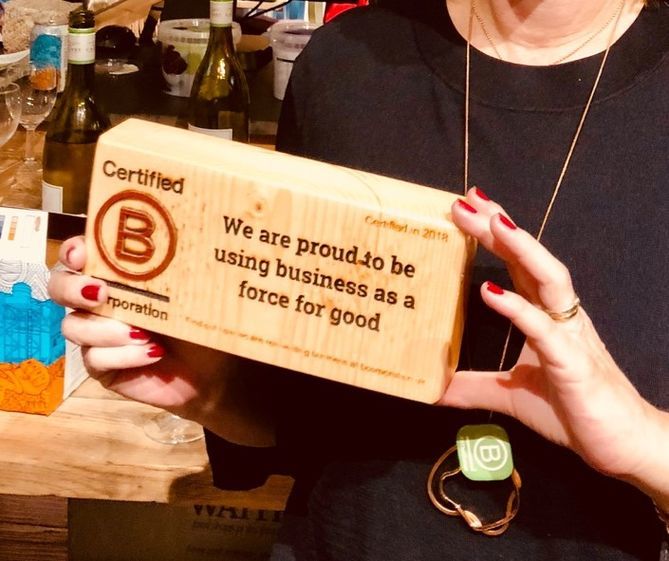
The rigorous B-Corp assessment looks at a company’s impact on its workers, customers, community, and environment. For us, it was a culmination of 18 months of hard work and adjustments to the way we work to achieve this goal, and we couldn’t be more thrilled.
B Corps are companies that balance profit with purpose. They use business as a force for good and limit their negative impact on the world. We are proud to be part of this growing global community.
At Articulate, we choose happiness
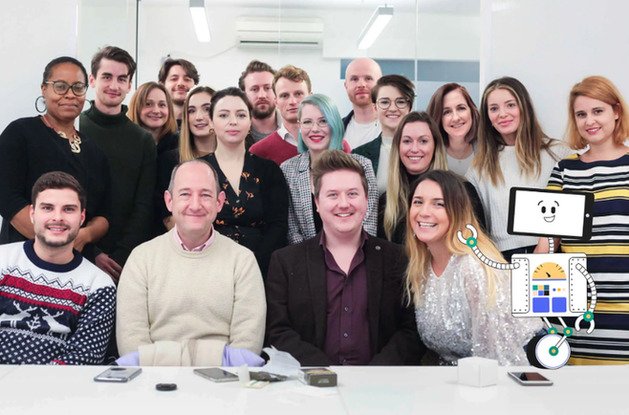
These are just a few things we are doing or have done which have impacted on the happiness at Articulate.
To say we are happy all of the time would be a lie. But what we do is try to sprinkle every week with something that will at the very least make us smile and brighten our working day.
Happier people are healthier people. Happier employees are more productive employees. There are many articles, blogs and statistics to prove this.
We have tried to build a successful, profitable, ethical, kind company but at the same time, we’ve done our best to make it a happy company. Yes, we have a Chief Happiness Officer, but everyone at Articulate is involved and makes an effort to sustain our happiness culture.
Have you made happiness a priority in your company? What have you tried? What is working for you? We would really love to hear all about it.
 Posted by
Liz - Chief Happiness Officer
Posted by
Liz - Chief Happiness Officer
